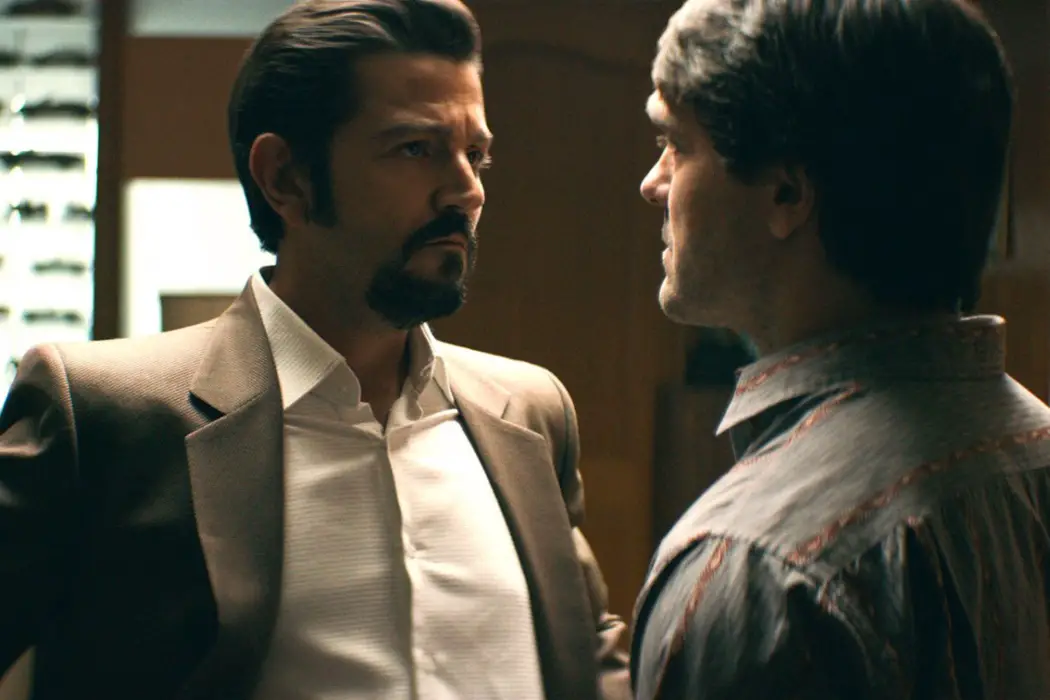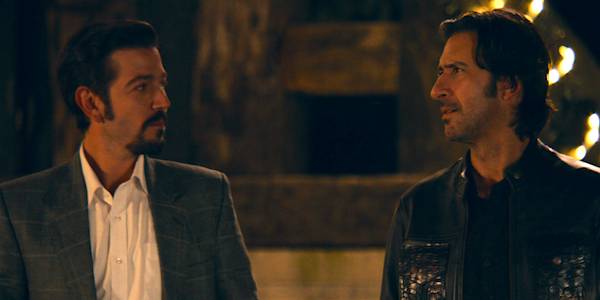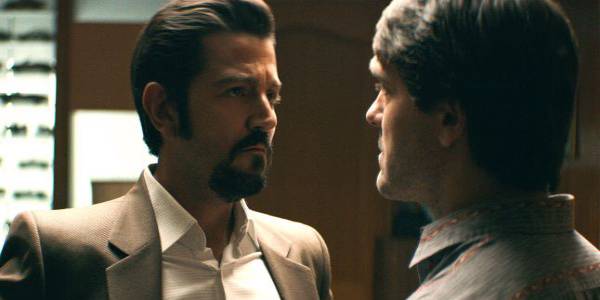NARCOS: MEXICO SEASON 2: Heavy Is The Head That Wears The Crown

Former film student from Scotland turned writer and film reviewer.
¿Plata o Plomo?
So ran the infamous tagline on Netflix’s original Narcos series. It was straightforward, and useful to sum up a key theme running through the three seasons focused mainly on two of Columbia’s well known cartels: the Medellín Cartel, and the Cali Cartel. It means, simply, silver or lead. Death or money.
It’s important to remember this because corruption is at the very heart of Narcos, a story which shows how powerful money really is, and how quickly the gatekeepers of moral and ethical justice were willing to turn a blind eye just to get it. The rise of Pablo Escobar and his cartel couldn’t be explained any other way.
There was another important theme running through Narcos, though: throughout his time on top of the Medellín Cartel, it was hard for Escobar to ignore the loneliness and isolation he felt both as a result of his own hubris and as head of an infamous cartel whom some wanted to see dead or in prison, and many others wanted to replace as kings of cocaine. Escobar eventually succumbed to this immense pressure and made a series of mistakes leading to his downfall.
This is the same situation Miguel Ángel Félix Gallardo (Diego Luna) faces as season two of Narcos: Mexico, the spin-off to the original Narcos, begins. Last season saw Gallardo consolidate his power in Mexico at the expense of Kiki Camarena (Michael Peña), the DEA agent whose shocking death at the end of last season left the viewer wondering just what Walter Breslin (played by narrator Scoot McNairy, finally getting a chance to come into his own this season) planned to do for revenge.

So with the DEA looking for revenge for their fallen comrade, the Columbians waiting for him to slip, and the in-fighting going on within his Federation, Gallardo has a lot on his plate. He presents a different personality than Escobar; where the Columbian was a hot-headed hurricane blowing his way through the corridors of power in South America, Gallardo is much more quiet and restrained. The first season saw him quietly and formidably build his empire from the backwater town of Sinaloa to the biggest cartel in Mexico. He was measured and controlled where Escobar was impulsive and violent, and after spending so much time with trigger happy sicarios it was refreshing to find someone who gave thought before action: more of a Michael Corleone than a Tony Montana.
All of that changes this season. Gallardo finds himself buckling under the pressure, losing control of his Federation as in-fighting between the Sinaloans and the Tijuanans threaten to explode into violence that could put everything at stake. On top of that is a new Presidential candidate who promises to destroy the cartels, and a rogue Narco (Pablo Acosta, played by Gerardo Taracena) to contend with. This makes for a lot of interesting drama and one thing Narcos: Mexico does well is handle all of these disparate threads quite deftly.
A Dish Best Served Cold
If loneliness and isolation is a theme for Gallardo then for Breslin it is revenge. We first see him at the end of season one as he is setting up a task force to take down those responsible for Camarena’s death. As season two starts, Operation Leyenda is well under way. Compared to the other characters in this series, Walt Breslin is actually a composite of many different DEA agents who worked to bring down Gallardo. It gives the character a little breathing room in terms of not being confined to actual events or people. This allows for McNairy to take the character in different directions and his Walt is one of the more fleshed out, well realised characters on the show.

McNairy is typically great at virtually any project he puts his hand to, from his breakout in Gareth Edward’s Monsters, to Ben Affleck’s Oscar winning Argo. With that being said, it’s great to see him in a long format show which allows him the space to explore his character and showcase his depth of talent. Breslin is something of a conflicted mess; bearing guilt for the death of his brother, an insatiable need to avenge Camarena (whom he never met), and frustration at butting heads with the bureaucracy which he sees as an impediment to his job.
Similar praise must go to Taracena for his performance as Acosta, whose arc this season is one of the most moving and rewarding of the show, providing the emotional ballast for some of the show’s more grittier moments. Any more information on the part he plays as this season unfolds would be spoiler territory and could potentially ruin the fun of discovery, but the kind of emotional resonance offered by Acosta throughout the season is certainly one of the highlights.
Stranger Than Fiction
Perhaps one of the most interesting aspects of both Narcos, and Narcos: Mexico is that they’re based on real life events. The series has always been keen to play up this aspect, interspersing real footage from those events into the show itself; this reminds us that there’s a real world stake to the drama that we’re watching, but it’s also very useful as a tool to create drama in and of itself.
For example early in the first season we’re introduced to a few of the Narcos around Sinaloa. Mostly these men are enforcers for the cartel that Gallardo comes to take control of, but those with an awareness of how real life events will play out might smirk when one seemingly irrelevant and diminutive enforcer is introduced as Joaquín “Chapo” Guzmán (played with fiery bombast by Alejandro Edda). In season 2, Chapo gets much more to do, and there’s a strange satisfaction from watching his interactions with others, knowing how powerful he eventually becomes in real life, although when/if the show will follow that journey remains to be seen.

With real world implications it would make sense for the production itself to be as true to the real locations as possible. This they do with aplomb, albeit at the tragic loss of location scout Carlos Muñoz Portal, who’s death a few years back while scouting possible locations for the show remain unsolved. It serves as a grim reminder of the brutality of life and the dangerous nature of Narcos. The world of Narcos: Mexico itself is rich in saturated, gritty colours and drips with Mexican culture. There is a real sense of the world these people inhabit; from the unbearable heat, to the often squalid conditions of locals, to the decadent lifestyle Gallardo and his partners live.
As well as this, the show provides no easy answers to the questions it raises, acknowledging that life is far more complicated than the simple black and white presented in lots of TV shows. The DEA – indeed any of the lawmakers in this series – aren’t always the good guys, in fact quite often the opposite, and the sicarios and drug kingpins – including Gallardo himself – are given moments of real depth and insight, showing that they aren’t simply monsters feeding off humanity, but real people whom circumstance and desire drew to this life. At one point during the Presidential election it is explained that the economy of Mexico had been rapidly sinking, leaving millions in poverty; it’s a stark reminder that, for a lot of these people, becoming a trafficker was the only real way out of their precarious situations.
Conclusion
Narcos: Mexico is a slightly different beast to its predecessor, albeit focusing on many of the same themes and narrative beats. Where the original felt a little more bombastic and immediate, Narcos: Mexico has always felt a little more slow and deliberate. This is really characterised by the emotional differences in its two main leads: Escobar from the original series – whose obsession with fame threatened to ruin him many times – and Gallardo were two very different people who ran their businesses in very different ways.
Ultimately though, the show stays close to its roots and provides an incredibly stylish, dramatic, and engaging story with plenty of flair and emotional resonance. It easily remains one of the best of Netflix’s original shows and, if Gallardo’s portentous speech at the end of this season is anything to go by – this is only just the beginning.
What did you think of Narcos: Mexico? Do you think it was true to the real-world events it portrayed? Let us know in the comments below!
Narcos: Mexico Season 2 is now available to stream on Netflix worldwide.
https://www.youtube.com/watch?v=AGv_F9hpQ-w
Does content like this matter to you?
Become a Member and support film journalism. Unlock access to all of Film Inquiry`s great articles. Join a community of like-minded readers who are passionate about cinema - get access to our private members Network, give back to independent filmmakers, and more.













